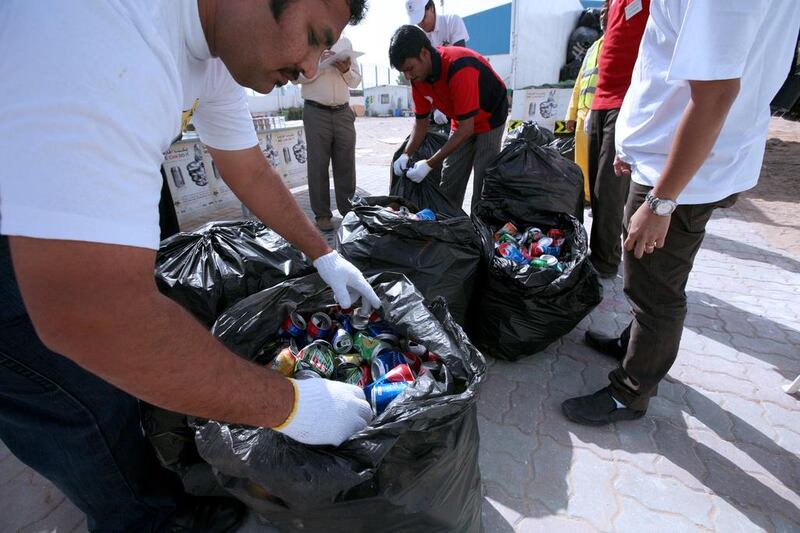DUBAI // Almost 1,800 tonnes of recyclable waste was collected last year by the Emirates Environment Group.
The vast majority of the more than 1.6 million kilograms of material it collected was paper, said Habiba Al Marashi, chairwoman of EEG.
“Paper is one of the most recyclable materials in the world as it is easy to be collected, stored and is clean and dry.
“Recycling paper entails preserving trees and saving energy, water and space in large landfills required for waste disposal.”
EEG conducted eight collection campaigns last year, each focusing on a different material to be recycled.
About 450 people took part in its aluminium-can collection campaign, together picking up 25,000kg of cans.
According to EGG’s website, the UAE sells 500 million cans every year and only 5 per cent are recycled, compared with 63 per cent recycled internationally.
“Aluminium is precious and can be 100 per cent recyclable,” Ms Marashi said. “The recycling process for aluminium can save up to 95 per cent of the energy needed for its production.”
According to the group, the can-collection campaign managed to save 1,695 MWh of energy and 617 cubic metres of landfill space.
The group has marked February 28 as its annual can-collection day, to support its year-round campaign. Ms Al Marashi said the effort last year was “remarkable”.
EEG said there are 12 million plastic containers sold every day in the UAE, which means there’s a huge scope for further recycling efforts.
Last year 80,000kg of plastic, the equivalent of 3,476 cubic metres of landfill space, was collected.
In addition, EEG collected 328,000kg of glass, saving 836 cubic metres of landfill, and preserving 226MWh of energy. The glass campaign has run since 2005.
The group also recycles batteries, with 73 people helping to collect 2,773kg last year. In addition, 91 participants collected 5,507kg of juice cartons.
EEG conducted awareness campaigns in conjunction with mobile-phone companies in schools on the proper disposal of e-waste. Last year, volunteers collected 1,984 old mobile phones for recycling.
Ms Al Marashi said that despite good uptake in the initiatives, there is always more that could be done.
“I would expect more from the private sector,” she said.
“We believe that to be successful we must have incentives for recycling and regulation and enforcement working hand in hand. The awareness is there, but it is about commitment and action.
“We have many organisations that have been on board with us for 10 to 15 years now and they have gone on to win awards on a regional and national level. But there are many thousands who are not yet engaged, we have not reached critical mass yet.
“Schools are doing well but universities still have a long way to go,” she said. “There is hardly any engagement with university students – they are really behind.
“Families are also slowly but surely coming on board with these programmes.”
Ms Al Marashi said that the statistics are a useful indicator of progress.
“When we announce how much has been collected, this is really about saying ‘yes, well done’ and to show those who have not yet started to have faith in this process and to get the desire to be actively supportive of these issues. We can only go so far – the support comes in active participation.
She highlighted that there was no reason the figures could not continue to improve.
“We have the facilities and the capacity and the partnership to improve and we work well with the infrastructure in place here.”
mcroucher@thenational.ae
ksinclair@thenational.ae





